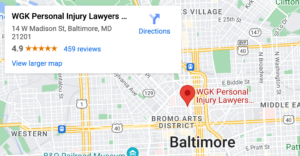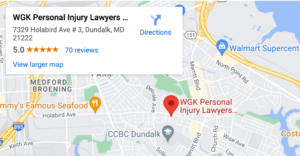
Car accidents are traumatic events that can cause physical pain and post-traumatic stress, which both can impact your life significantly. If you are not a lawyer or have never been involved in a personal injury lawsuit, the legal process will naturally be unfamiliar. Trying to understand statutes that apply to a claim can be confusing and time-consuming, and it’s easy to make mistakes that can diminish the value of your claim.
The best and quickest way to understand how Maryland statutes will impact your personal injury claim is to contact an experienced Maryland personal injury lawyer.
To speak with an attorney about your car accident or personal injury case, contact our Baltimore law firm at WGK Personal Injury Lawyers at (410) 837-2144.
Table of Contents
Statutes Will Influence Every Aspect of Your Injury Case

Like other states, Maryland has specific laws that outline when you can file a lawsuit, who you can sue, and what you can sue for.
The main Maryland statutes which may impact your personal injury or wrongful death claim are related to:
- Required minimum insurance
- Statute of limitations
- Contributory negligence
- Medical malpractice
- Damage caps for non-economic damages.
Maryland is one of only four states plus the District of Columbia that has a pure contributory negligence law, which can severely impact your ability to recover damages in a car accident at all.
An attorney can explain which laws apply to your case, how to avoid claim denials, and how to recover the maximum compensation you are entitled to.
What is a Statute?
The Code of Maryland is the public record of all statutes in force by the State of Maryland. These were originally printed in large black volumes, but are now printed in red volumes, divided by major subject areas such as:
- Agriculture
- Alcoholic Beverages
- Courts & Judicial Proceedings
- Criminal Law
- Education
- Environment
- Insurance
- Real Property
- Tax
- Transportation.
Statutes restrict how much time you have to file a lawsuit, where you must file a lawsuit, and how a lawsuit must be served to a defendant. A personal injury lawyer can explain which statutes may apply to your personal injury claim.
Claims Against the State of Maryland or a Municipality
If you are injured on government property or injured in a traffic accident caused by a government employee’s negligence, you may bring a claim against a state, county, or city government.
If you wish to bring a personal injury claim against a Maryland government agency, you must follow some additional rules which are found in the Maryland Tort Claims Act (MCTA).
You must send a “claim letter” to the Maryland State Treasurer with a concise statement of facts including the date and location of the accident, specific damages requested, the name and addresses of all parties, and your signature.
There is a one-year deadline for claims. You may still bring a claim after the one-year deadline, but the court will decide whether to allow the case to proceed.
Contributory Negligence: Allocating Fault and Liability in a Maryland Personal Injury Claim
Under the Tenth Amendment of the United States Constitution, states have the ability to govern their own laws as long as they are within the scope of the constitution. As a result, states handle insurance claims and personal injury lawsuits differently than others.
Maryland, along with Virginia, North Carolina, Alabama, and the District of Columbia, follow a pure contributory negligence law.
How pure contributory negligence is simple: If you contribute to the fault of an accident at all, you are not entitled to receive compensation from the other driver’s insurance company.
Examples of contributory negligence include:
- Speeding
- Failing to use a signal
- Jaywalking (in a pedestrian accident)
- Driving under the influence of drugs or alcohol
- Distracted driving
If this doctrine seems harsh, that’s because it is.
If you are even 1% responsible for an accident, you cannot recover anything. For insurance companies, this eliminates a lot of lawsuits. If a defendant can show that your negligence contributed to an accident in any way, they are off the hook for damages.
Note: your negligence must have contributed to the accident, not to your injuries being worse. For example, not wearing your seat belt can make injuries worse but will not cause an accident. Not wearing your seat belt is not considered evidence of contributory negligence.
Survival Actions and Wrongful Death Claims in Maryland
Another unique aspect of Maryland law is that there are two civil remedies for accidental death.
A “survival action” allows the recovery compensation to the victim’s estate for pain and suffering, actual expenses, and other damages incurred by the victim right up to the moment of death.
A wrongful death lawsuit provides compensation for damages incurred after death and by surviving family members. Maryland has limits (caps) on the amount of recovery that may be paid for economic and non-economic damages.
In Maryland, a wrongful death claim or lawsuit must be filed within three years after the injured person’s death under § 3-904(g)(1). Survival actions must also be brought within three years. Claims against a government entity should be brought within one year to avoid possible legal pushback or claim denials.
Damages in a Maryland wrongful death claim may compensate a wife, husband, parent, and child of the deceased person. Under § 3-904(b) of the statute, if the person died without having a surviving spouse, parent, or child, then another person related to the victim by blood or marriage who substantially depended upon them may have a right to damages in a wrongful death claim.
WGK Personal Injury Lawyers Can Help You Understand How Maryland Statutes Can Impact Personal Injury Claims
After an accident resulting in personal injury or death, it is never too early to contact a Maryland personal injury attorney. As soon as you’ve received medical attention for your injuries, contact WGK Personal Injury Lawyers to discuss your potential case.
Our Baltimore personal injury lawyers have been representing people and families in Maryland since 1977. We are not afraid to take on big insurance companies, corporations, and government agencies. We will advocate for your legal rights and fight to maximize your compensation.
Our Baltimore law firm offers a free consultation to answer your questions and explain your legal options. If we represent you, under our contingency fee arrangement, we will not charge any fees unless we recover money for you.


